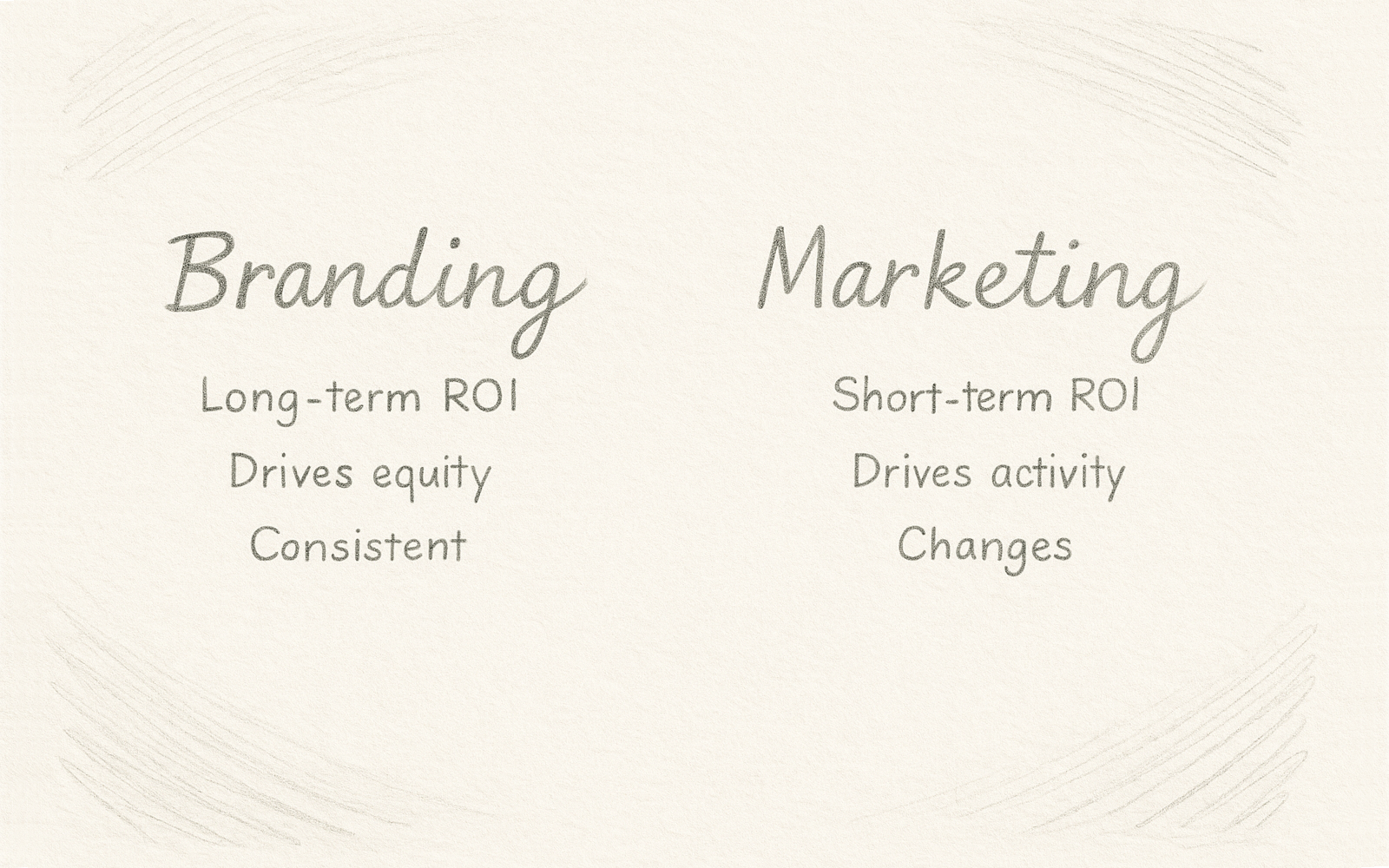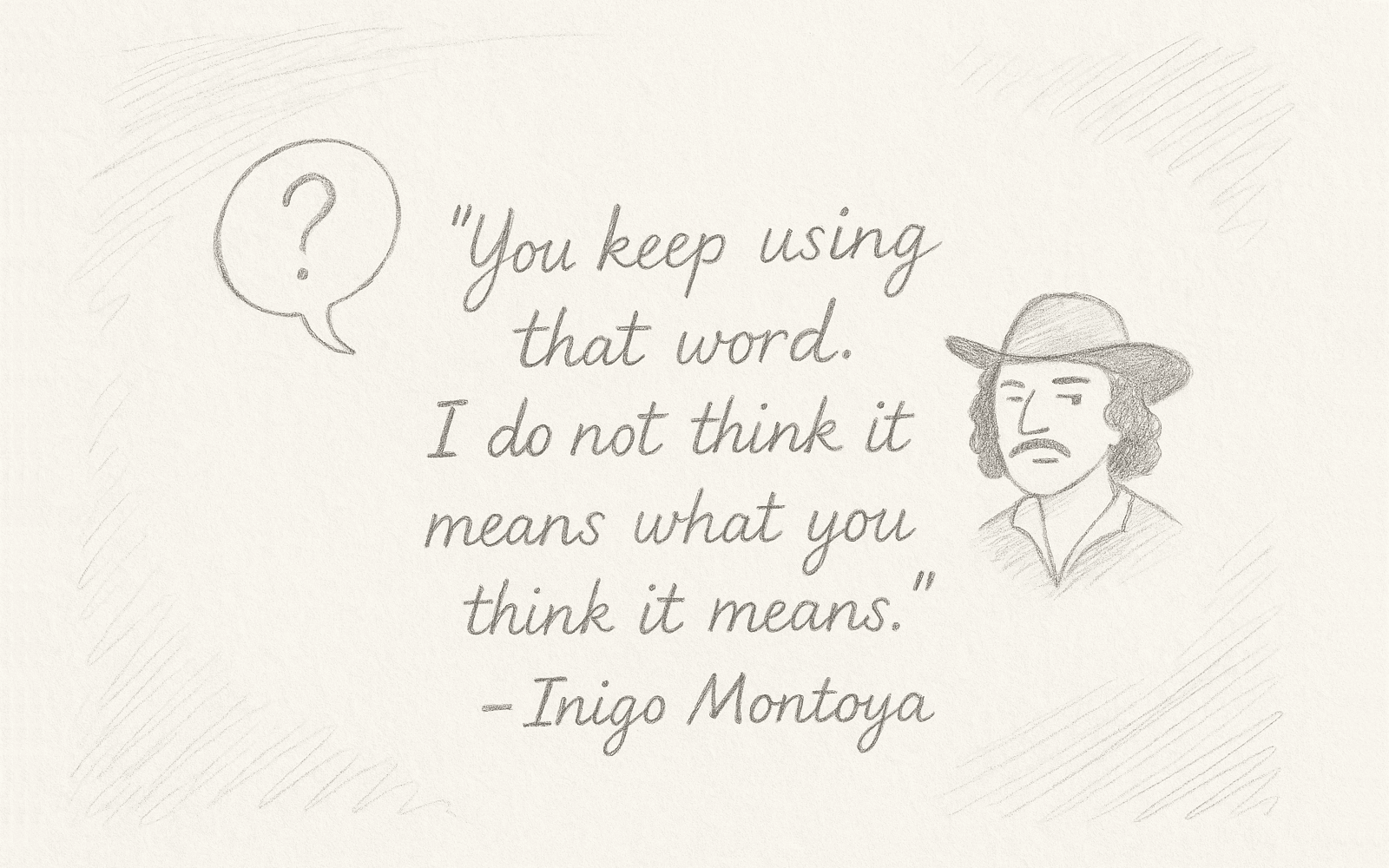People commonly confuse branding and marketing. It doesn’t help that there is no clear, universally agreed-upon definition of what branding even is.
Most people, if asked, generally know what marketing is. They might say, “Marketing is promoting your products,” and although not comprehensive, they wouldn’t be wrong. But answering what branding is? That’s not likely to get you a clear answer.
When people ask me what my job is, I say, “Branding”. If they have a blank look in their eyes, I’ll say “It’s like marketing” (even though it’s not really), and they say something like, “Ahhh, got it!”. Some words just don’t mean the same thing to different people — and branding is one of them.
What is the difference between branding and marketing?
Branding shapes who you are: your values, purpose, and promise. Marketing expresses that identity through campaigns, messaging, and experiences in the world. Branding provides the foundation and tone; marketing builds on it to attract, engage, and convert your audience.
The definition of branding
If you asked someone what branding is, they might answer with any of the following:
- Branding is design
- Branding is your logo
- Branding is your image
- Branding is a function of marketing
Those are all connected to branding but aren’t what branding is.
The Oxford English Dictionary is widely considered the definitive English dictionary. They define branding as “the promotion of a particular product or company by means of advertising and distinctive design.” They define marketing as “the action or business of promoting and selling products or services, including market research and advertising.”
That is essentially the same definition. No wonder people are confused if the world’s most respected English dictionary can’t even get the difference right.
“You keep using that word. I do not think it means what you think it means.” — Inigo Montoya
The ISO definition is better, saying, “As an intangible asset, brands, unlike machinery, buildings or products, have no physical substance. Whereas brands can have tangible value as trademarks or customer lists, the primary value of the brand is intangible.”
When I make presentations about branding, the definition I use is “Brands are a human construct to help people understand and relate to a business on a deeper level. Branding is about harnessing the soul of a company.”
What is branding?
A brand is an impression in your mind
Branding is simply the process of creating desired impressions of your company and its products in people’s minds. This happens through touchpoints, ranging from advertising to product experience to customer service to word of mouth. The brand is a mental impression, and branding is the process of creating and promoting that mental impression. If what your brand is doing and what people are thinking isn’t aligned, brands fail (or at least flail).
A brand is evoked by symbols
The name, the logo, the design — these are all symbols of a brand. The creation of the symbols is not the creation of the brand; they are tools to help communicate a brand. Branding happens when those brand symbols meet experiences. Over time, those symbols then trigger memories and impressions
A brand is human
A brand can be just as complicated, fragile, and fallible as human beings. In business, branding is the discipline of understanding the very soul of the company. That means branding deals with culture, core values, beliefs, purpose, and more. There’s an adage that it takes a lifetime to build trust and a moment to break it. It’s true with people, and it’s true in branding.

Branding vs marketing: How are they different?
Branding and marketing are made overly complicated by jargon. You thought it was bad enough that there’s not a clear definition of branding. Wait until you try and figure out the definition of mission, vision, purpose, and values.
But there are some important differences. Branding creates long-term ROI, drives equity, and is consistent. Marketing creates short-term ROI, drives activity, and changes.
To further simplify the difference between branding and marketing, let’s look at some well-known brands:
Starbucks branding vs marketing
- Starbucks marketing is “Pumpkin Spice latte is here!” or “Download our app.”
- Starbucks branding is seeing a Starbucks logo on the street and knowing what it’s going to feel like inside the store. Knowing you’re going to get something you want, and knowing that the people who work there will be helpful (until they aren’t).
Google branding vs marketing
- Google marketing is “Get the new Pixel 5” or “Redeem your AdWords credit.”
- Google branding is how they make finding information so easy, no matter where you are, and how they seem to give you just what you need, exactly when you need it.
Patagonia branding vs marketing
- Patagonia marketing is “50% sale on past-season clothing” or “We see you left something in your bag.”
- Patagonia branding is how you feel part of a movement to save the planet when you buy things from them, and even more so when you don’t.
Investing in branding vs marketing
You might think that branding is expensive, and even question why invest in branding when you’re already investing in marketing? The truth is that marketing (and particularly advertising) is the most expensive way possible to build a brand.
Investing in branding need not be expensive; it can actually be cheap. You simply need to know exactly who you are and do everything you do with who you are in mind. How you spend money on that to build your brand is up to you.
Setting budgets
Marketing spend is something you calculate based on the activity you want to drive. Branding spend is more arbitrary. In branding, at a minimum, you should maximize every customer touchpoint to get the most out of every dollar you’re already spending regardless of whether it’s advertising, an event, your swag, or your internal communications.
Hiring an agency
Before hiring an agency, make sure you know if you need marketing or branding help. If you need marketing help so you can grow, be clear on that with yourself and with them. No agency will know the soul of your company, and therefore your brand like you do.
An agency may have enlightening insights about your brand, and they can be very helpful if you need someone to help you see your brand more clearly. But don’t let anyone charge you to try and convince you your company should be someone that it’s not.
Who is responsible for branding vs marketing
Marketing can report to branding, but branding shouldn’t report to marketing. Ultimately your brand is the soul of the company, and responsibility for that lies at the top with the founder, owner, or CEO. Sometimes a CEO manages brand on their own when their vision is very clear, and other times they need someone by their side to help them crystalize and translate, particularly in complex organizations.
In the end, nobody in an organization is entirely in control of brand, because every decision every employee makes affects brand. This is why it’s so important that leaders communicate what their brand is about, so their team can make the right decisions for the brand.
Moving past vs and working together
Everything’s better when people work together, and branding vs marketing is no exception. Brands can’t exist if marketing isn’t fueling growth. Marketing has to work that much harder if the brand is weak.
Knowing what each brings to the table, appreciating how incredibly different yet co-dependent branding and marketing are, is critical. Someday dictionaries will catch up and create definitions that help make things clearer so that we can all get back to work doing what we do best.
FAQ: Understanding Branding vs Marketing
Always start with branding. It defines who you are and ensures every marketing effort is aligned and effective.
Your brand identity sets the narrative—marketing shares that narrative in ways that engage and convert your ideal clients.
Not sustainably. Without a brand, marketing becomes inconsistent and shallow, and ROI dwindles.
